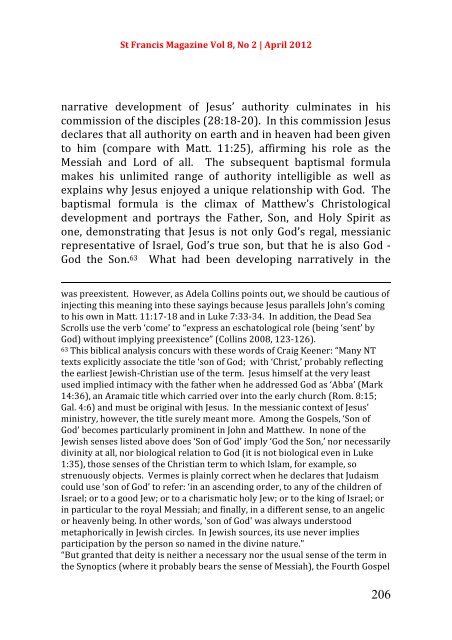Untitled - St.Francis Magazine
Untitled - St.Francis Magazine
Untitled - St.Francis Magazine
Create successful ePaper yourself
Turn your PDF publications into a flip-book with our unique Google optimized e-Paper software.
<strong>St</strong> <strong>Francis</strong> <strong>Magazine</strong> Vol 8, No 2 | April 2012 narrative development of Jesus’ authority culminates in his commission of the disciples (28:18-‐20). In this commission Jesus declares that all authority on earth and in heaven had been given to him (compare with Matt. 11:25), affirming his role as the Messiah and Lord of all. The subsequent baptismal formula makes his unlimited range of authority intelligible as well as explains why Jesus enjoyed a unique relationship with God. The baptismal formula is the climax of Matthew’s Christological development and portrays the Father, Son, and Holy Spirit as one, demonstrating that Jesus is not only God’s regal, messianic representative of Israel, God’s true son, but that he is also God -‐ God the Son. 63 What had been developing narratively in the was preexistent. However, as Adela Collins points out, we should be cautious of injecting this meaning into these sayings because Jesus parallels John’s coming to his own in Matt. 11:17-‐18 and in Luke 7:33-‐34. In addition, the Dead Sea Scrolls use the verb ‘come’ to “express an eschatological role (being ‘sent’ by God) without implying preexistence” (Collins 2008, 123-‐126). 63 This biblical analysis concurs with these words of Craig Keener: “Many NT texts explicitly associate the title ‘son of God; with ‘Christ,’ probably reflecting the earliest Jewish-‐Christian use of the term. Jesus himself at the very least used implied intimacy with the father when he addressed God as ‘Abba’ (Mark 14:36), an Aramaic title which carried over into the early church (Rom. 8:15; Gal. 4:6) and must be original with Jesus. In the messianic context of Jesus' ministry, however, the title surely meant more. Among the Gospels, ‘Son of God’ becomes particularly prominent in John and Matthew. In none of the Jewish senses listed above does ‘Son of God’ imply ‘God the Son,’ nor necessarily divinity at all, nor biological relation to God (it is not biological even in Luke 1:35), those senses of the Christian term to which Islam, for example, so strenuously objects. Vermes is plainly correct when he declares that Judaism could use ‘son of God’ to refer: ‘in an ascending order, to any of the children of Israel; or to a good Jew; or to a charismatic holy Jew; or to the king of Israel; or in particular to the royal Messiah; and finally, in a different sense, to an angelic or heavenly being. In other words, 'son of God' was always understood metaphorically in Jewish circles. In Jewish sources, its use never implies participation by the person so named in the divine nature." “But granted that deity is neither a necessary nor the usual sense of the term in the Synoptics (where it probably bears the sense of Messiah), the Fourth Gospel 206







![Reflections on Surah Fatiha and the Lord's Prayer[1] - St.Francis ...](https://img.yumpu.com/49377951/1/184x260/reflections-on-surah-fatiha-and-the-lords-prayer1-stfrancis-.jpg?quality=85)








